Analyzing Copyright Issues in the NFT Market from the "Infringement" Incident of Metaka Wars
Author: Blockchain Blue Ocean
In recent years, the NFT field has been continuously developing, benefiting from the open nature of blockchain, allowing everyone to become a creator. Many artists have uploaded their works to the blockchain in the form of NFTs, "issuing" them on various platforms, and many creators have launched successful derivative works based on well-known NFT projects.
These amazing innovations have shown the NFT track to be vibrant, while also leading to various disputes, especially copyright disputes.
Some creators have used well-known IP without authorization from the copyright holders, which clearly violates the law and infringes on intellectual property rights. More often, the lack of knowledge among industry participants about how to protect copyrights leads to legal flaws during licensing and copyright transfer, resulting in disputes that can harm the interests of copyright holders. For project teams, once a project falls into a public relations crisis over infringement, it can be condemned by the community, potentially leading to the project being "sentenced to death."
Very few projects in the market can emerge unscathed after facing disputes. Recently, the Metaka Wars project team faced allegations of infringement, but their effective crisis management resolved what could have been a significant FUD event for the project.
The incident involved NFT Azuki#6918 holder @TrungTranNft publicly accusing the Metaka Wars team on social media of merging elements of Azuki#6918 with Metaka Wars without permission and publicly releasing it as marketing material.
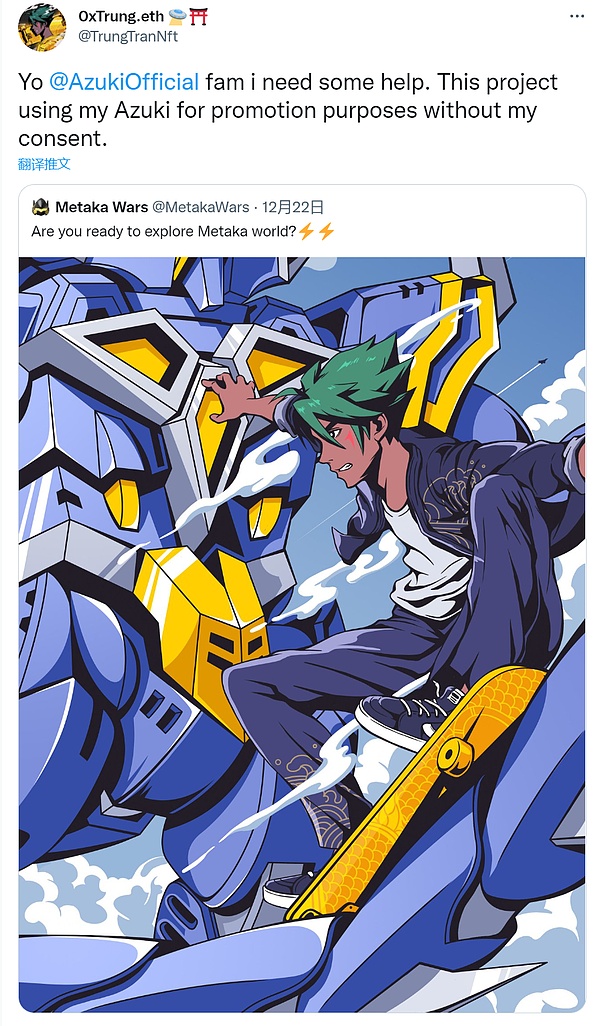
Metaka Wars is personally involved with Kunio Okawara, the "father of Gundam." As one of Japan's earliest mecha designers, Okawara is renowned in the anime industry worldwide, with representative works including "Invincible Steel Titan 3," "Mobile Suit Gundam," and "Science Ninja Team Gatchaman." Particularly in "Gundam G," Okawara's illustrations had a huge impact on the Gundam model craze that swept Japan in 1981. Many fans in China also remember waiting in front of the TV after school to watch the anime during their childhood.
Due to Okawara's direct involvement and the popularity of the Gundam IP, Metaka Wars generated significant buzz even before its launch. After going live, it performed impressively, quickly minting out after the official sale, ranking fifth on the OS trading volume leaderboard, with the floor price rising fivefold within hours, demonstrating the project's popularity.
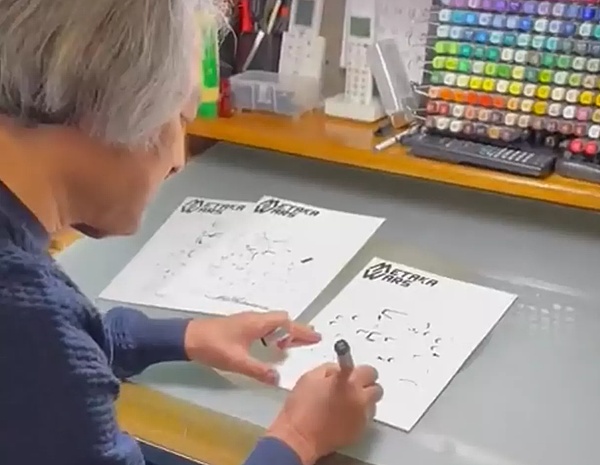
The higher the project's popularity, the greater the impact of negative news.
After the incident broke, it had a significant impact within the NFT enthusiast community. Not only did the Azuki community express criticism towards the Metaka Wars project team, but many holders within the Metaka Wars community also showed negative sentiments.
The Metaka Wars team's response was relatively swift. After encountering the crisis, they clarified the situation within hours, publicly explaining the details. They stated that Metaka Wars did not unlawfully use elements of Azuki#6918 without permission; instead, they paid the previous holder for authorization, and at the time of obtaining the authorization, Azuki#6918 had not changed hands.
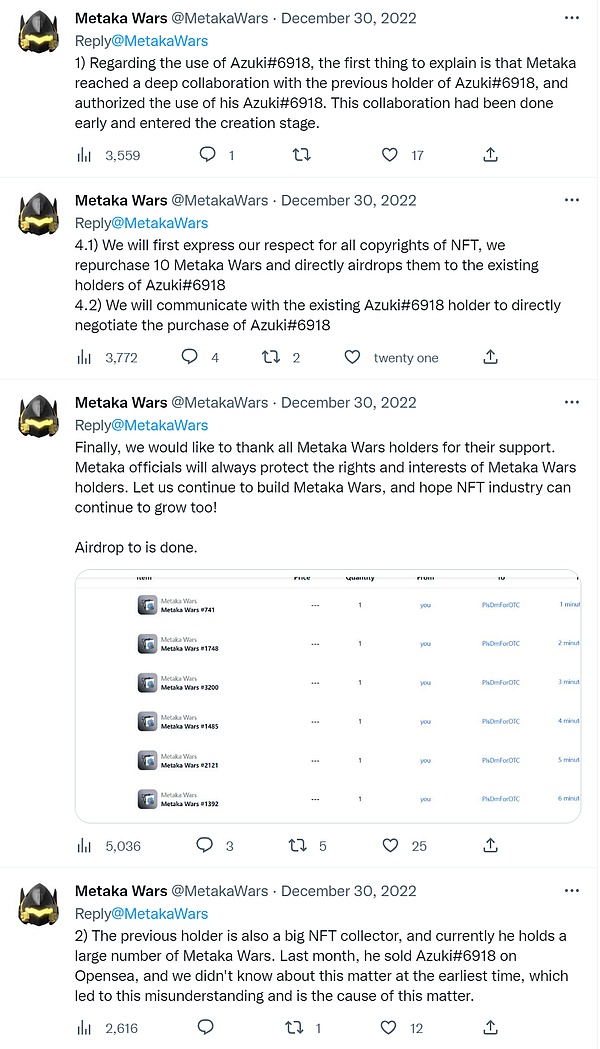
The Metaka Wars team did not just issue a cold announcement to end the matter; they took a proactive approach to resolve the issue, proposing a sincere negotiation plan. They offered to purchase 10 Metaka Wars NFTs from the market to airdrop to @TrungTranNft as an apology, valued at approximately 2000 USD based on the Metaka Wars floor price of about 0.16 ETH. The Metaka Wars team also expressed a desire to negotiate with @TrungTranNft to purchase Azuki#6918, hoping to fundamentally resolve the matter.
The project team's response quickly turned public opinion around, and more community members who learned the truth began to speak up for Metaka Wars.
A day later, @TrungTranNft tweeted again, stating that he received the cooperation agreement provided by Metaka Wars with the previous holder, along with 10 NFTs, and he believed this was sufficient to use the Azuki#6918 IP. The official Metaka Wars Twitter also retweeted, stating that they had reached a settlement with @TrungTranNft. This marked the first time a copyright dispute in the NFT market was publicly addressed on social media, facing the issue head-on and resolving it peacefully.
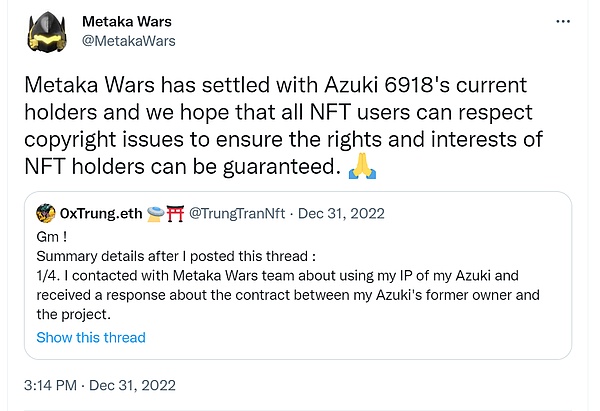
Thus, this "infringement" crisis was perfectly resolved. As the "victim," @TrungTranNft protected his copyright and gained substantial benefits; as the "infringer," Metaka Wars clarified the facts, escaped the public relations crisis over copyright infringement, and gained advertising, with many holders from the Azuki community starting to pay attention to Metaka Wars.
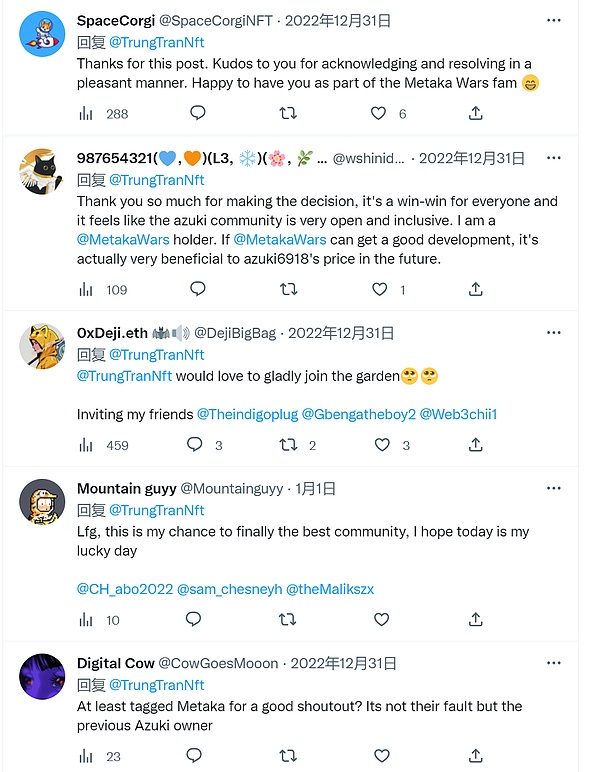
Although the Metaka Wars incident has come to a close, countless similar "infringement" events continue to occur in the industry. Many projects can easily fall into copyright disputes, hindering their development and even forcing them to cease operations. If such incidents happen occasionally, it may be a project issue, but if they occur frequently, it is necessary to consider what problems exist in the copyright landscape of the entire NFT industry.
We must understand that nothing is perfect from the start; new things are often imperfect at their inception and can even disrupt existing systems. As a new field that has emerged in recent years, NFTs have many copyright issues, but we can also look back at the various copyright disputes that arose after the advent of the internet.
As early as the mid-1990s, when people entered the internet era, various artistic works began to be digitized. The internet provided a vast new platform that could quickly attract fans and find new audiences. Artists could disseminate their works more efficiently without relying on traditional distribution channels.
However, while the internet brought convenience, it also led to a surge of pirates who copied and sold artists' works and software products, leaving copyright holders without any compensation and making it extremely difficult to protect their rights through legal means. Even large tech platforms like Amazon, leveraging their market dominance, wield significant power when selling digital works, resulting in creators receiving minimal shares.
Over the past few decades, countless debates have arisen around internet copyright policy issues, and after multiple revisions, copyright law has become relatively refined, effectively protecting the rights of copyright holders on the internet.
Entering the Web3 era, how to protect copyrights has become even more complex.
Does owning an NFT on the blockchain truly represent ownership of the corresponding physical object in reality? Can the transfer of an NFT also transfer the ownership and copyright of the physical object? Legislators have yet to find effective solutions to these questions, which is a fundamental reason for the frequent occurrence of infringement in the entire NFT market.
Many NFT projects give far less consideration to the legal aspects of their designs compared to the artistic and technical aspects. If adequate preparations are not made in advance, attempting to patch things up after problems arise can lead to catastrophic consequences. This may cause additional losses and disputes for holders and creators who purchase licenses. For example, the licensing agreement for the Azuki project is quite vague regarding how commercial licenses are handled during NFT transfers, leaving significant room for interpretation, which led to the "infringement" incident with Metaka Wars.
The first U.S. copyright law was established in 1790, and it has taken over two hundred years and six amendments to reach the relatively refined legal framework we have today. We cannot expect the copyright protection issues in the NFT field to be perfect from the outset.
We need to recognize and accept the reality that legislative work on NFT copyright protection in various countries has not even begun, and it may be a lengthy process that could take years or even decades to continuously improve.
Despite the frequent copyright issues in the current NFT market, looking at a longer time frame, the entire field of NFT copyright protection is developing at a surprising speed.
In 2017, some well-known NFT projects, including Crypto Punks, were released with almost no clear copyright terms. When Larva Labs issued Crypto Punks, they did not attach any formal written permissions, and their website did not provide terms granting buyers rights to use the content and characters, which limited the subsequent development of Crypto Punks.
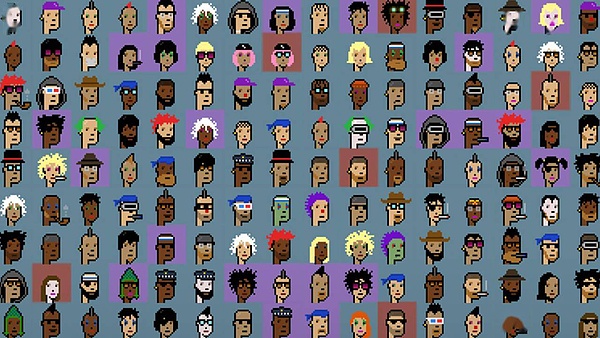
Later, Larva Labs attempted to retroactively add copyright licenses, considering two models to streamline copyright structures: one involved signing written documents for copyright rights transfer with all holders; the other involved shifting the model to have Larva Labs hold the copyright while granting CryptoPunks purchasers non-exclusive, specific-use rights to the corresponding NFTs.
However, neither of these approaches was implemented, which limited the ecological development of Crypto Punks.
In contrast, the Bored Ape Yacht Club, launched in 2021, has emerged as a standout. The key reason lies in the decentralized copyright system supporting Bored Ape Yacht Club.
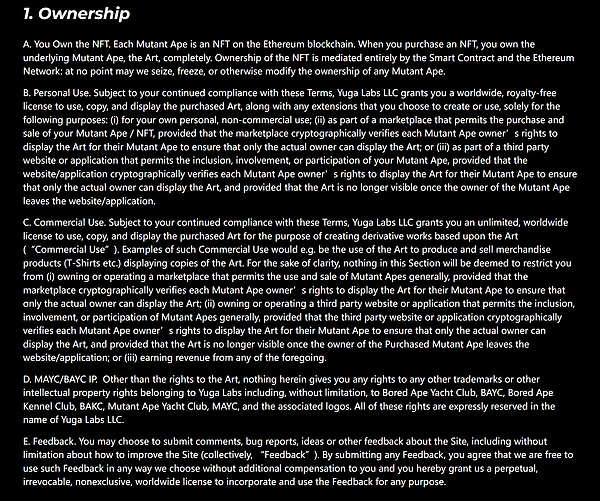
BAYC describes copyright with the following statement:
You own the NFT. Each Bored Ape is an NFT on the Ethereum blockchain. When you purchase the NFT, you fully own the underlying Bored Ape. The ownership of the NFT is entirely mediated by smart contracts and the Ethereum network, and we cannot seize, freeze, or otherwise modify the ownership of any Bored Ape at any time.
After purchasing BAYC, buyers not only hold the NFT but also the complete ownership of the underlying bored ape artwork. This means that the ownership of the bored ape cannot be seized, frozen, or otherwise modified under any circumstances. Moreover, Yuga Labs grants owners unlimited global licenses to use, copy, and display the purchased works, allowing for the creation of derivative works based on that artwork.
The winds rise from the edge of the green grass, and waves form from subtle ripples.
Looking back over the years, through the joint efforts of creators, project teams, and participants, more and more NFT projects are placing greater emphasis on respecting the interests of copyright holders and protecting their original IP. From the complete lack of copyright terms at the time of Crypto Punks' release to the relatively comprehensive explanations provided by Bored Ape Yacht Club regarding ownership, commercial licenses, and potential copyright disputes over derivatives.
The commercial scale derived from IP copyright is also continuously expanding. Even a new project like Metaka Wars is actively utilizing its IP. According to its roadmap, it has begun collaborating with well-known gaming companies to create a mecha faction combat metaverse, and will also launch comics, films, figurines, exhibitions, and more in the future. If they can effectively leverage the golden brand of Kunio Okawara and Gundam to bring these IP derivatives to fruition, it could very well become the next major ecosystem after BAYC.
Perhaps the NFT field will continue to face many copyright issues for a long time to come, but it is slowly getting better, isn't it?








